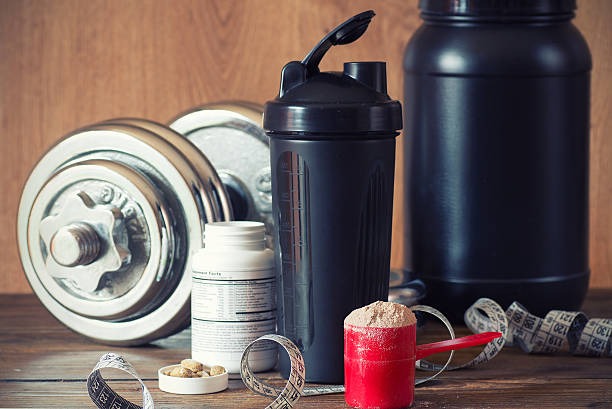the best resource to reach your fitness goals - join our community
In the pursuit of fitness and muscle gain, many individuals turn to gym supplements to enhance their performance and recovery. A well-chosen supplement regimen can support strength, endurance, and overall fitness goals. This article explores various popular gym supplements, including protein, creatine, and amino acids, outlining their functions and benefits.
Protein is essential for muscle repair and growth, while creatine can improve strength and high-intensity exercise performance. Glutamine and Beta-alanine also play crucial roles in recovery and workout endurance. Additionally, weight gainers and HMB (beta-hydroxy beta-methylbutyrate) are tailored for those looking to increase muscle mass effectively.
Understanding the specific benefits of each supplement helps individuals tailor their approach to training and nutrition. By incorporating the right supplements, athletes and fitness enthusiasts can optimize their workouts and achieve their desired results more efficiently.
Supplements can be categorized into several types, including:
Protein Powders: These enhance muscle recovery and growth. They are often derived from whey, casein, or plant sources.
Creatine: Known for increasing strength and power during high-intensity workouts, creatine helps improve overall exercise performance.
Weight Gainers: Formulated to increase caloric intake, they are useful for those looking to gain mass.
Amino Acids: Essential for muscle building, they support recovery and reduce fatigue.
Glutamine: This amino acid aids in muscle recovery and reduces soreness after intense training sessions.
Beta-Alanine: This supplement helps combat muscle fatigue, allowing for longer training sessions.
HMB (Beta-Hydroxy Beta-Methylbutyrate): It assists in muscle preservation and may aid in recovery.
Supplements serve to fill nutritional gaps, especially for those with specific fitness goals. They can optimize performance, enhance recovery, and support muscle growth.
For example, protein powders provide a quick and convenient source of essential amino acids post-workout. Creatine improves energy availability during workouts, making it easier to push limits.
Some supplements, like glutamine and amino acids, are particularly beneficial during intense training phases, as they promote recovery and muscle maintenance.
Using these supplements in conjunction with a balanced diet can lead to more effective workouts and better overall health. Each supplement offers unique benefits, aligning with specific fitness objectives
Gym For Life - Supplement Guide


Types of Supplements
Role in Fitness and Nutrition
Protein supplements play a crucial role in supporting muscle growth, recovery, and overall health. These supplements help individuals meet their daily protein requirements efficiently, especially for those engaged in intense training or looking to increase muscle mass.
Benefits of Protein
Protein is essential for repairing and building muscle tissue. It aids in muscle recovery after exercise, reduces muscle soreness, and promotes overall strength gains. Key benefits include:
Muscle Growth: Stimulates protein synthesis to enhance muscle size.
Weight Management: Helps in reducing body fat while preserving lean muscle.
Satiety: Increases feelings of fullness, which can aid in appetite control.
Regular intake of protein supplements can lead to improved workout performance and quicker recovery, allowing individuals to train more effectively.
Different Forms of Protein
Protein supplements are available in several forms, each with unique characteristics:
Whey Protein
Whey protein is a fast-digesting, high-quality, complete protein derived from milk during the cheese-making process. It's rich in essential amino acids and quickly absorbed by the body, making it popular for muscle recovery and building
Common food sources of whey protein:
Whey protein powder or shakes (concentrate, isolate, or hydrolysate forms)
Milk (contains both whey and casein proteins)
Yogurt, especially Greek yogurt
Cheese (though most whey is removed during cheese production)
Casein Protein
Casein protein is a slow-digesting, high-quality protein found in milk. Unlike whey, it releases amino acids gradually, making it ideal for sustained muscle repair—often used before bedtime to support overnight recovery.
Common food sources of casein protein:
Milk (roughly 80% of milk’s protein is casein)
Cheese (especially cottage cheese, which is rich in casein)
Yogurt (particularly Greek yogurt, though it contains both whey and casein)
Casein protein powder (available as a supplement)
Egg Protein
Egg protein is a complete, high-quality protein found primarily in egg whites. It’s rich in essential amino acids and highly bioavailable, making it excellent for muscle repair, satiety, and general nutrition.
Common food sources of egg protein:
Whole eggs (contain both protein and healthy fats)
Egg whites (pure protein, low in calories and fat)
Egg protein powder (often made from dried egg whites)
Egg protein digests at a moderate rate—slower than whey but faster than casein—offering a balanced option for many dietary needs.
Plant-based Proteins
Plant-based protein comes from non-animal sources and can be either complete or incomplete, depending on the amino acid profile. It’s popular for vegetarians, vegans, and those with dairy sensitivities, and can support muscle building, overall health, and environmental sustainability.
Common food sources of plant-based protein:
Legumes (lentils, chickpeas, black beans)
Soy products (tofu, tempeh, edamame – soy is a complete protein)
Whole grains (quinoa, oats, brown rice)
Nuts and seeds (almonds, chia seeds, hemp seeds, pumpkin seeds)
Plant-based protein powders (made from peas, rice, hemp, soy, etc.)
Choosing the right type of protein supplement depends on dietary preferences, goals, and lactose tolerance.
Protein Supplements
Creatine is a widely researched supplement known for its benefits in enhancing athletic performance and muscle growth. It aids in energy production during high-intensity exercise and supports faster recovery.
Mechanism of Creatine in Muscle Growth
Creatine primarily functions by replenishing adenosine triphosphate (ATP), the energy currency of cells, during strenuous physical activities. This replenishment allows for improved performance in strength training and high-intensity workouts.
When supplemented, creatine promotes a greater water retention in muscle cells. This hydrating effect not only enhances muscle volume but also contributes to increased protein synthesis, leading to muscle growth over time.
Additionally, creatine has been shown to reduce muscle breakdown and improve recovery rates post-exercise. As a result, athletes often experience enhanced performance and increased muscle mass, especially when combined with resistance training.
Dosage and Safety
Typical dosage for creatine ranges from 3 to 5 grams per day. A loading phase of 20 grams daily for 5-7 days may enhance muscle saturation but is not necessary for everyone.
Creatine is generally considered safe for most individuals when taken at recommended doses. Some may experience gastrointestinal discomfort or dehydration; monitoring hydration levels is advisable.
Long-term studies indicate no significant adverse effects on kidney or liver function in healthy individuals using creatine. It is important for individuals with pre-existing health conditions to consult with a healthcare professional before starting creatine supplementation.
Creatine
Amino acids play a critical role in muscle development and recovery. They are essential for protein synthesis and serve various functions in the body, promoting overall health and fitness.
Essential vs. Non-Essential Amino Acids
Amino acids are categorized into two groups: essential and non-essential.
Essential Amino Acids: These cannot be synthesized by the body and must be obtained through diet. There are nine essential amino acids, including leucine, isoleucine, and valine. They primarily support muscle growth and repair.
Non-Essential Amino Acids: These can be produced by the body and are not required from dietary sources. Examples include alanine and glutamic acid. While they may not be critical daily, they aid metabolic functions and tissue repair.
Incorporating a variety of both types can optimize muscle recovery and support overall health.
BCAAs and Muscle Proteins Synthesis
Branched-Chain Amino Acids (BCAAs) consist of three essential amino acids: leucine, isoleucine, and valine. They are crucial for muscle protein synthesis and play a key role in reducing muscle soreness after exercise.
Studies show that BCAAs can stimulate muscle growth by triggering protein synthesis mechanisms. Leucine, in particular, is known for its effectiveness in promoting muscle recovery and growth.
Additionally, BCAAs may help decrease fatigue during workouts. By supplementing with BCAAs, athletes often experience improved exercise performance and reduced muscle breakdown.
Amino Acids: Building Blocks of Muscle
Weight gainers are dietary supplements designed to provide a high-calorie option for individuals looking to increase muscle mass. They are particularly useful for those who struggle to consume enough calories through regular meals alone.
Composition of Weight Gainers
Weight gainers typically contain a mix of macronutrients aimed at promoting muscle growth. Key components include:
Carbohydrates: Often the largest proportion, sourced from oats, maltodextrin, or sugars. Carbs provide energy for workouts and recovery.
Proteins: Generally made from whey, casein, or plant-based proteins. Protein is essential for muscle repair and growth.
Fats: Includes healthy fats like MCT oil or flaxseed oil, which help increase calorie density without excessive volume.
Other ingredients may include added vitamins, minerals, and creatine to support overall performance and recovery.
When to Use Weight Gainers
Timing can significantly influence the effectiveness of weight gainers. They are best used:
Post-Workout: Consuming a weight gainer within 30 minutes after exercising helps to replenish glycogen stores and aids muscle recovery.
Between Meals: Utilizing weight gainers as snacks can help achieve the necessary caloric surplus.
Using them strategically can support consistent muscle growth and recovery for individuals with higher caloric needs due to intense training.
Weight Gainers
NMN, or nicotinamide mononucleotide, has gained attention for its potential effects on energy metabolism and recovery. It serves as a precursor to NAD+, an essential molecule involved in various cellular processes.
Understanding NMN
NMN is a nucleotide derived from ribose and nicotinamide. It plays a crucial role in the synthesis of NAD+ (nicotinamide adenine dinucleotide) in the body. As individuals age, NAD+ levels tend to decline, which can impact cellular function.
Supplementing with NMN may help restore NAD+ levels, potentially improving energy metabolism. Research suggests that adequate NAD+ levels are important for maintaining cellular health and supporting various biological processes, including DNA repair and antioxidant defense.
NMN's Role in Energy and Recovery
NMN supplementation may enhance energy production by elevating NAD+ levels. This process can lead to improved mitochondrial function, which is vital for cellular energy generation.
Furthermore, studies indicate that NMN can aid in recovery from exercise by reducing muscle fatigue and improving overall endurance. Enhanced NAD+ levels may facilitate better recovery through improved metabolism of nutrients and faster repair of damaged tissues.
Incorporating NMN into a supplement regimen can be beneficial for those seeking to optimize energy levels and enhance recovery after intense physical activity.
NMN (nicotinamide mononucleotide)
Glutamine plays a crucial role in muscle recovery and overall health. This amino acid supports the body in various ways, particularly after intense exercise. Understanding its function and optimizing intake can enhance recovery and performance.
Glutamine's Function in the Body
Glutamine is the most abundant amino acid in the body, primarily found in muscles. It plays a vital role in protein synthesis, which is essential for muscle repair and growth.
After intense workouts, glutamine levels can drop significantly. This depletion can lead to muscle soreness, fatigue, and a longer recovery period.
Additionally, glutamine supports immune function, aiding in the body’s defense against illness during rigorous training periods. It also helps maintain gut health, which is crucial for nutrient absorption.
Optimizing Glutamine Intake
To maximize the benefits of glutamine, athletes and fitness enthusiasts can consider supplementation or incorporate glutamine-rich foods into their diets.
Supplementation:
Recommended dosage ranges from 5 to 10 grams post-workout.
Available in powder, capsule, and tablet forms.
Dietary Sources:
Meat (beef, chicken, turkey)
Fish (salmon, tuna)
Dairy (milk, yogurt)
Plant-based Sources (beans, spinach, cabbage)
Combining glutamine with a balanced diet ensures an adequate intake to support recovery. Monitoring stress levels and maintaining hydration can further optimize glutamine's effects on muscle recovery.
Glutamine
HMB, or Beta-Hydroxy Beta-Methylbutyrate, is a metabolite of the amino acid leucine. It plays a significant role in muscle preservation, particularly during periods of intense training or caloric restriction. Understanding its mechanisms and strategic usage can enhance training outcomes.
Understanding HMB
HMB helps to reduce muscle protein breakdown, which is particularly beneficial in preventing muscle loss during cutting diets or after injury. Research shows that HMB can promote muscle recovery and strength gains.
Mechanism: It enhances protein synthesis by inhibiting the action of enzymes that break down muscle proteins.
Benefits: Studies indicate that supplementation may lead to increased muscle mass, improved strength, and reduced recovery times.
HMB is often utilized by both athletes and those in rehabilitation settings to promote muscle maintenance.
Strategic Use of HMB in Training Regimes
Incorporating HMB into a training regimen requires strategic timing and dosage.
Recommended Dosage: The typical dosage ranges from 3 to 6 grams per day.
Timing: For best results, it is effective when taken before or after workouts, enhancing recovery and muscle preservation during high-intensity activities.
Athletes often utilize HMB during cutting phases to maintain strength while losing weight. Additionally, individuals recovering from surgery or injury may benefit significantly from its muscle-preserving properties, aiding in a quicker return to normal activity levels.
HMB (Beta-Hydroxy Beta-Methylbutyrate)
Beta-Alanine is recognized for its potential to enhance athletic performance, particularly in endurance exercises. It is known to increase muscle carnosine levels, which can help buffer acid during high-intensity activities.
Beta-Alanine for Endurance
Beta-Alanine supplementation is primarily associated with improved performance in endurance sports. By increasing muscle carnosine, it helps to reduce fatigue and increase exercise capacity.
Athletes engaged in activities lasting from 1 to 4 minutes may experience the most significant benefits. Common exercises include:
Sprinting
High-intensity interval training (HIIT)
Weight lifting
Studies suggest that the optimal dosage for performance enhancement is around 2 to 5 grams per day. When combined with a consistent training regimen, it can lead to improved results in endurance tasks.
Scientific Evidence on Beta-Alanine
Numerous studies have investigated the effects of Beta-Alanine on physical performance. Research indicates that supplementation can lead to significant increases in exercise capacity.
In a meta-analysis of various studies, Beta-Alanine demonstrated:
Increased training volume
Improved performance times
Enhanced recovery rates
For instance, one study found that individuals supplementing with Beta-Alanine saw a 20% increase in high-intensity exercise duration. These findings consistently support the efficacy of Beta-Alanine, particularly for athletes looking for performance improvements in anaerobic conditions.


